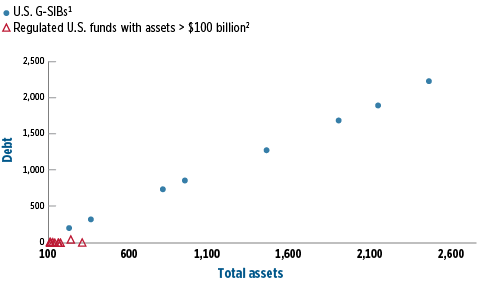ICI Viewpoints
Size by Itself Doesn’t Matter—Leverage Does
Second in a series of Viewpoints postings on funds and financial stability.
The threshold set by the Financial Stability Board (FSB) for examining whether a regulated fund could pose risk to the financial system should be redrawn—or better yet, withdrawn.
The FSB’s consultation puts size front and center, saying that funds with more than $100 billion in assets under management should automatically be reviewed as candidates for designation as global systemically important financial institutions, or global SIFIs. But size alone is not an accurate indicator of systemic risk. Regulators should instead prominently focus on balance-sheet leverage—the essential fuel for financial crises.
Size Alone Tells Little About Risk
Leverage can tell a lot about a financial institution’s capacity for systemic risk. In times of market stress, leverage helps turn small decreases in asset values into large losses, and spreads those losses across the financial system. Financial crises—including the most recent meltdown—generally stem from institutions whose losses were magnified by high amounts of leverage, and then spread throughout the financial system.
Because banks are highly leveraged, focusing regulators’ attention on the biggest banks makes sense. Outside the banking system, size alone is less useful as an indicator of risk. One must consider it along with leverage. Yet funds use virtually no leverage, so a threshold that concentrates only on assets under management as an indicator of possible risk is not appropriate.
Moreover, stock and bond funds—whatever their size—share traits that preclude them from transmitting systemic risk, such as simple capital structures, transparent balance sheets, and stable investor bases with diversified portfolio holdings. Because of their lack of leverage, structure, and existing regulation, even the largest of these funds don’t pose a threat to global financial stability.
Screening for Systemic Risk More Effectively
The size of a bank’s balance sheet and the amount of its debt go hand-in-hand—the larger the bank, the more debt the bank has. This is the nature of banks, which take deposits (by definition creating indebtedness), use those deposits to make loans, and then seek to earn a spread on the difference between borrowing and lending rates.
Accordingly, U.S. banks designated as global SIFIs are highly leveraged, with an average balance-sheet leverage ratio of 10.7—nearly $11 in assets for every $1 in equity. The 11 largest U.S. stock and bond funds, by contrast, are barely leveraged at all, with an average balance-sheet leverage ratio of 1.04. At these ratios, a fund would have to hold $5.4 trillion in assets—17 times the holdings of the world’s largest regulated fund—to reach the amount of debt held by the smallest U.S. bank designated as a global SIFI.
Large Size Does Not Imply That a Regulated U.S. Fund with Assets Greater Than $100 Billion Is Systemically Important
Billions of dollars

1Assets for U.S. global systemically important banks (G-SIBs) are those reported by FDIC for G-SIBs as of 2013:Q2.
2Assets for regulated U.S. funds are those reported by Lipper as of December 31, 2013.
Sources: Investment Company Institute, Lipper, fund documents
In addition, focusing on a fund’s size without considering leverage results in inconsistent treatment of different types of financial institutions—contrary to the FSB’s stated goals. Banks and regulated funds are different types of financial institutions. For banks, size and debt go hand-in-hand. That’s not the case for funds, where size plays no role in the amount of debt. In fact, the world’s largest regulated fund, with $307 billion in assets, carries a balance-sheet leverage ratio of 1.01—virtually no debt at all.
Leverage is key to determining whether a financial institution can threaten financial stability. Regulators who fail to take that into account are working from the wrong blueprint.
For more information on ICI's views and research on financial stability, please visit our Financial Stability Resource Center or read the other entries in this Viewpoints series:
Mike McNamee is ICI's chief public communications officer.
